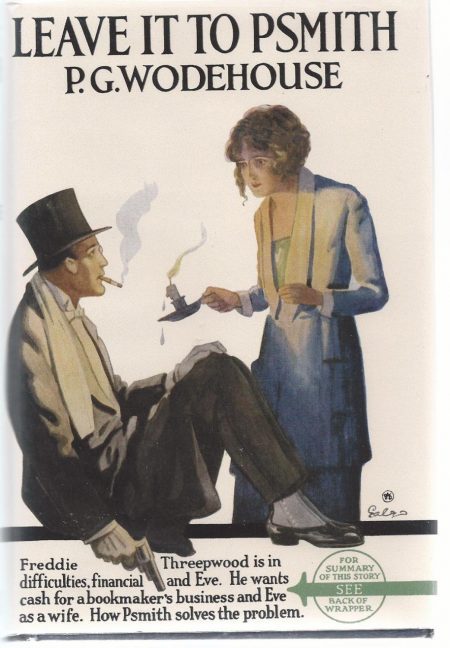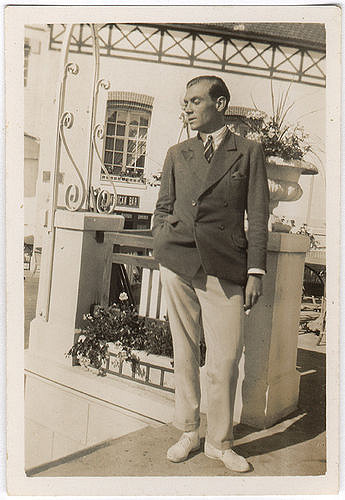LEAVE IT TO PSMITH (6)
By:
February 5, 2019

Leave It to Psmith (1923) is the last and most rewarding of four novels featuring the dandy, wit, and would-be adventurer Ronald Eustace Psmith, one of P.G. Wodehouse‘s most popular characters. (“One can date exactly,” Evelyn Waugh claimed, in reference to Psmith’s debut in the 1909 novel Mike, “the first moment when Wodehouse was touched by the sacred flame.”) Leave It to Psmith‘s copyright enters the public domain in 2019; HiLoBooks is pleased to serialize this terrific book here at HILOBROW. Enjoy!

4.
Exhilaration is a heady drug ; but, like other drugs, it has the disadvantage that its stimulating effects seldom last for very long. For perhaps ten minutes after his uncle had left him, Freddie Threepwood lay back in his chair in a sort of ecstasy. He felt strong, vigorous, alert. Then by degrees, like a chilling wind, doubt began to creep upon him — faintly at first, then more and more insistently, till by the end of a quarter of an hour he was in a state of pronounced self-mistrust. Or, to put it with less elegance, he was suffering from an exceedingly severe attack of cold feet.
The more he contemplated the venture which he had undertaken, the less alluring did it appear to him. His was not a keen imagination, but even he could shape with a gruesome clearness a vision of the frightful bust-up that would ensue should he be detected stealing his Aunt Constance’s diamond necklace. Common decency would in such an event seal his lips as regarded his Uncle Joseph’s share in the matter. And even if — as might conceivably happen — common decency failed at the crisis, reason told him that his Uncle Joseph would infallibly disclaim any knowledge of or connexion with the rash act. And then where would he be? In the soup, undoubtedly. For Freddie could not conceal it from himself that there was nothing in his previous record to make it seem inconceivable to his nearest and dearest that he should steal the jewellery of a female relative for purely personal ends. The verdict in the event of detection would be one of uncompromising condemnation.
And yet he hated the idea of meekly allowing that two thousand pounds to escape from his clutch…
A young man’s cross-roads.
The agony of spirit into which these meditations cast him had brought him up with a bound from the comfortable depths of his arm-chair and had set him prowling restlessly about the room. His wanderings led him at this point to collide somewhat painfully with the long table on which Beach the butler, a tidy soul, was in the habit of arranging in a neat row the daily papers, weekly papers, and magazines which found their way into the castle. The shock had the effect of rousing him from his stupor, and in an absent way he clutched the nearest daily paper, which happened to be the Morning Globe, and returned to his chair in the hope of quieting his nerves with a perusal of the racing intelligence. For, though far removed now from any practical share in the doings of the racing world, he still took a faint melancholy interest in ascertaining what Captain Curb, the Head Lad, Little Brighteyes, and the rest of the newspaper experts fancied for the day’s big event. He lit a cigarette and unfolded the journal.
The next moment, instead of passing directly, as was his usual practice, to the last page, which was devoted to sport, he was gazing with a strange dry feeling in his throat at a certain advertisement on page one.
It was a well-displayed advertisement, and one that had caught the eye of many other readers of the paper that morning. It was worded to attract attention, and it had achieved its object. But where others who read it had merely smiled and marvelled idly how anybody could spend good money putting nonsense like this in the paper, to Freddie its import was wholly serious. It read to him like the Real Thing. His motion-picture-trained mind accepted this advertisement at its face-value.
It ran as follows ;
LEAVE IT TO PSMITH!
Psmith Will Help You
Psmith Is Ready For Anything
DO YOU WANT
Someone To Manage Your Affairs?
Someone To Manage Your Business?
Someone To Take The Dog For A Run?
Someone To Assassinate Your Aunt?
PSMITH WILL DO IT
CRIME NOT OBJECTED TO
Whatever Job You Have To Offer
(Provided It Has Nothing To Do With Fish)
LEAVE IT TO PSMITH!
Address Applications To ‘R. Psmith, Box 365′
LEAVE IT TO PSMITH!
Freddie laid the paper down with a deep intake of breath. He picked it up again, and read the advertisement a second time. Yes, it sounded good.
More, it had something of the quality of a direct answer to prayer. Very vividly now Freddie realized that what he had been wishing for was a partner to share the perils of this enterprise which he had so rashly undertaken. In fact, not so much to share them as to take them off his shoulders altogether. And such a partner he was now in a position to command. Uncle Joe was going to give him two thousand if he brought the thing off. This advertisement fellow would probably be charmed to come in for a few hundred…
Two minutes later, Freddie was at the writing-desk, scribbling a letter. From time to time he glanced furtively over his shoulder at the door. But the house was still. No footsteps came to interrupt him at his task.
Freddie went out into the garden. He had not wandered far when from somewhere close at hand there was borne to him on the breeze a remark in a high voice about Scottish obstinacy, which could only have proceeded from one source. He quickened his steps.
‘Hallo, guv’nor.’
‘Well, Frederick?’
Freddie shuffled.
‘I say, guv’nor, do you think I might go up to town with you this afternoon?’
‘What!’
‘Fact is, I ought to see my dentist. Haven’t been to him for a deuce of a time.’
‘I cannot see the necessity for you to visit a London dentist. There is an excellent man in Shrewsbury, and you know I have the strongest objection to your going to London.’
‘Well, you see, this fellow understands my snappers. Always been to him, I mean to say. Anybody who knows anything about these things will tell you greatest mistake go buzzing about to different dentists.’
Already Lord Emsworth’s attention was wandering back to the waiting McAllister.
‘Oh, very well, very well.’
‘Thanks awfully, guv’nor.’
‘But on one thing I insist, Frederick. I cannot have you loafing about London the whole day. You must catch the twelve-fifty train back.’
‘Right ho. That’ll be all right, guv’nor.’
‘Now, listen to reason, McAllister,’ said his lordship. ‘That is all I ask you to do — listen to reason…’
SERIALIZED BY HILOBOOKS: Jack London’s The Scarlet Plague | Rudyard Kipling’s With the Night Mail (and “As Easy as A.B.C.”) | Arthur Conan Doyle’s The Poison Belt | H. Rider Haggard’s When the World Shook | Edward Shanks’ The People of the Ruins | William Hope Hodgson’s The Night Land | J.D. Beresford’s Goslings | E.V. Odle’s The Clockwork Man | Cicely Hamilton’s Theodore Savage | Muriel Jaeger’s The Man With Six Senses | Jack London’s “The Red One” | Philip Francis Nowlan’s Armageddon 2419 A.D. | Homer Eon Flint’s The Devolutionist | W.E.B. DuBois’s “The Comet” | Edgar Rice Burroughs’s The Moon Men | Charlotte Perkins Gilman’s Herland | Sax Rohmer’s “The Zayat Kiss” | Eimar O’Duffy’s King Goshawk and the Birds | Frances Hodgson Burnett’s The Lost Prince | Morley Roberts’s The Fugitives | Helen MacInnes’s The Unconquerable | Geoffrey Household’s Watcher in the Shadows | William Haggard’s The High Wire | Hammond Innes’s Air Bridge | James Branch Cabell’s Jurgen | John Buchan’s “No Man’s Land” | John Russell’s “The Fourth Man” | E.M. Forster’s “The Machine Stops” | John Buchan’s Huntingtower | Arthur Conan Doyle’s When the World Screamed | Victor Bridges’ A Rogue By Compulsion | Jack London’s The Iron Heel | H. De Vere Stacpoole’s The Man Who Lost Himself | P.G. Wodehouse’s Leave It to Psmith | Richard Connell’s “The Most Dangerous Game” | Houdini and Lovecraft’s “Imprisoned with the Pharaohs” | Arthur Conan Doyle’s “The Sussex Vampire.”
RADIUM AGE SCIENCE FICTION: “Radium Age” is HILOBROW’s name for the 1904–33 era, which saw the discovery of radioactivity, the revelation that matter itself is constantly in movement — a fitting metaphor for the first decades of the 20th century, during which old scientific, religious, political, and social certainties were shattered. This era also saw the publication of genre-shattering writing by Edgar Rice Burroughs, Sax Rohmer, E.E. “Doc” Smith, Jack London, Arthur Conan Doyle, Aldous Huxley, Olaf Stapledon, Karel Čapek, H.P. Lovecraft, Charlotte Perkins Gilman, Yevgeny Zamyatin, Philip Gordon Wylie, and other pioneers of post-Verne/Wells, pre-Golden Age “science fiction.” More info here.
READ GORGEOUS PAPERBACKS: HiLoBooks has reissued the following 10 obscure but amazing Radium Age science fiction novels in beautiful print editions: Jack London’s The Scarlet Plague, Rudyard Kipling’s With the Night Mail (and “As Easy as A.B.C.”), Arthur Conan Doyle’s The Poison Belt, H. Rider Haggard’s When the World Shook, Edward Shanks’ The People of the Ruins, William Hope Hodgson’s The Night Land, J.D. Beresford’s Goslings, E.V. Odle’s The Clockwork Man, Cicely Hamilton’s Theodore Savage, and Muriel Jaeger’s The Man with Six Senses. For more information, visit the HiLoBooks homepage.
